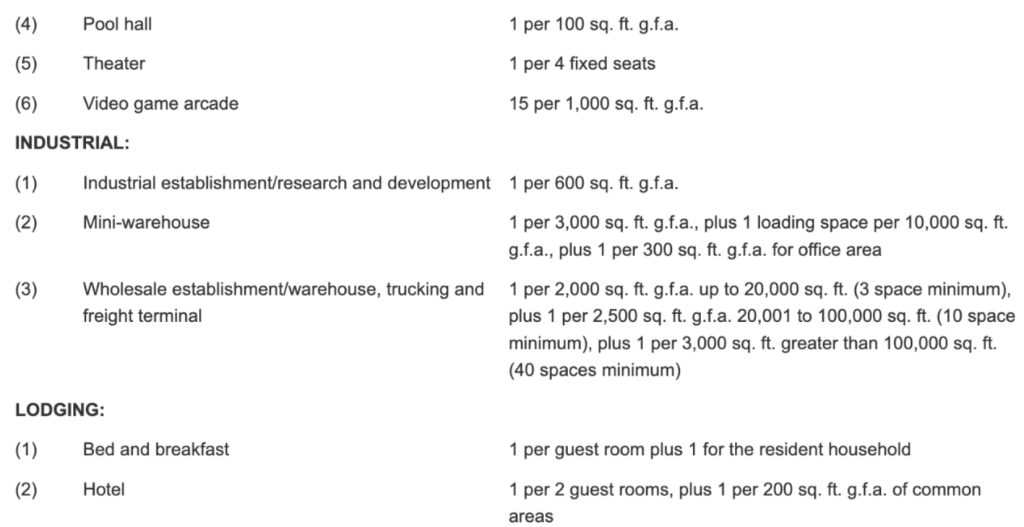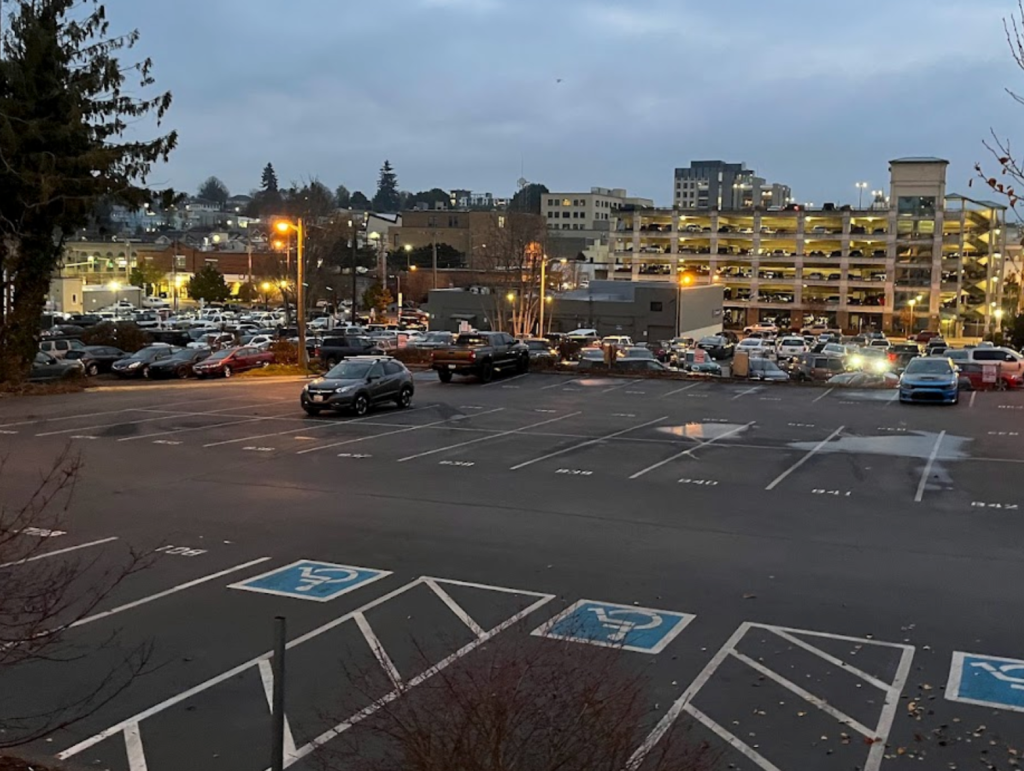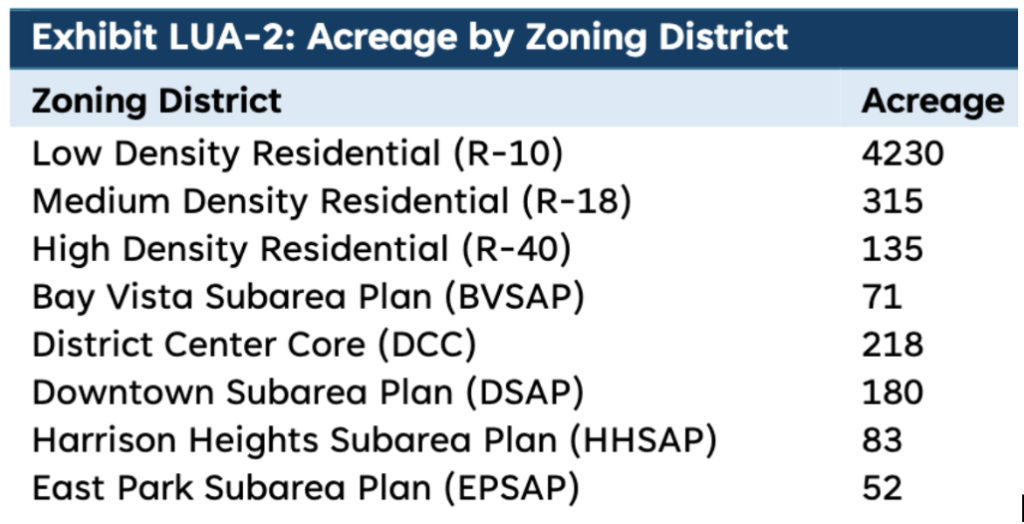
Bremerton seems poised to eliminate parking mandates citywide and adopt a market-based parking policy, as part of the City’s Comprehensive Plan update. Majorities on both Bremerton’s Planning Commission and City Council seem to be in favor of market-based parking, and public resistance has not materialized. The Planning Commission will vote on Monday, May 19th.
Ending the city’s parking mandate would not prevent or prohibit new parking. Instead, new housing and commercial developments would decide on a project-by-project level how much parking is needed, which helps drive down the cost of new housing. Adopting market-based parking (as dozens of US cities have) is a well-studied policy that results in more housing, increased tax base and reduced dependence on single-occupancy vehicles.
In its 2025 session, Washington State Legislature passed statewide parking reform that would eventually have forced Bremerton to scale back parking mandates to one stall per two homes in most cases and exempt small commercial spaces and those in mixed-use residential buildings. Cities with populations between 30,000 and 50,000, such as Bremerton, have until 2028 to comply. However, Bremerton appears to be on a proactive course of action, complying early and going beyond the floor the state has set.
Onerous off-street parking requirements
Bremerton’s current off-street parking regulations is vast at 17 pages and more than 5,400 words, with specific parking minimums for 48 different types of businesses – including pool halls, bowling alleys and racquetball clubs. Despite the regulatory ink spilled, Bremerton has nary a pool hall, bowling alley, nor a racquetball club.

Parking mandates for new housing are particularly onerous. A theoretical 80-unit, 5-story apartment block, which might require 16,000 square feet of land for the building itself, but would need nearly 50,000 square feet for the 160 required parking stalls – that’s about the size of a football field. If those 160 stalls were built as ‘structured’ parking inside the building, each stall would add at least $25,000, or $4 million in total, to the cost of the building.
Bremerton’s current parking regulations make homes more expensive, reduce the total number of new homes built and make urban in-fill housing less profitable. The high cost of developing in the City incentivizes sprawling development on top of former forests in unincorporated Kitsap County. That sprawl increases traffic, vastly expands expenses to maintain roads, sewers and school bus routes, and chokes off growth of Bremerton’s property tax base.

Final debates on parking minimums
All year, parking reform has been advancing as part of Bremerton’s 2044 Comp Plan. Elimination of parking minimums seems to have a strong majority on Bremerton’s Planning Commission and City Council, and virtually no dissent has yet been heard from the public, or Mayor Greg Wheeler (who rarely weighs in on controversial issues).
In a February meeting, the Planning Commission looked set to approve recommendations for “Staff to remove minimum parking requirements within the Comprehensive Plan… in Land Use policy LU1-Cen(F)… [and] Transportation policy TR5(K)”.
A last minute curveball was thrown in the subsequent April 21st Planning Commission meeting, when Commissioner Richard Tift (who is also a city council candidate) requested a final debate on the topic of excluding ‘Low Density Residential’ (LDR) zones from parking reforms.

Excluding LDR, as Commissioner Tift recommends, would gut parking reform. LDR zones make up 80% of the parts of the City zoned for housing, pushing nearly all affordable housing into just 20% of the City. Excluding LDR would drive up the cost of development over the vast majority of Bremerton, would make many in-fill housing projects impractical and hinder homeowners from adding accessory dwelling units on their properties.
Planning Commissioners — and later City Council — must vote down Commissioner Tift’s proposal.
Mission critical: More housing in Bremerton
Bremerton is desperate for more housing. Additionally, the U.S. Navy has recently announced a multi-billion-dollar plan to expand and modernize Bremerton’s shipyards, meaning an immediate influx of 5,000 construction workers and thousands of additional permanent jobs once the expansion is complete.
In 2022, Bremerton’s Kitsap County announced a shortage of 9,500 housing units, requiring 1,400 new homes every year. But Kitsap has averaged just over 1,200 new homes per year over the past five years, and over 75% of those were built outside Bremerton city limits, most in sprawling suburban subdivisions. This housing pattern forces Bremerton workers into long commutes, which snarl traffic, increase air pollution, stretch public services like utilities and school bus routes.
Bremerton desperately needs to increase infill housing — homes built within the City, on land already served by streets, utilities and school buses. Bremerton’s current parking regulations make new housing much more expensive. And if low-density residential is excluded from parking reform, Bremerton will never realize sufficient infill growth.
Towards market-based parking
Bremerton’s move to market-based parking is good government. For decades, Bremerton’s development has been governed by heavy-handed, one-size-fits-all regulations that assume well-meaning City officials know better than the people who own the land and seek to build on it.
Homebuilders generally aren’t clueless people. They are risking their own money and have every incentive to build homes that people want. They are profit seeking and therefore carefully balance the extra expense of building parking units against the higher price they can charge for parking amenities.
Small, inexpensive apartments near Bremerton’s ferries and shipyard may be prized by people who get around on foot or a scooter, or by a single mom on a budget. Larger, more expensive projects would still come with ample off-street parking, often times more than is required.
Market-based parking does not mean no new parking. A study of Seattle’s 2012 parking minimum reduction showed developers still built 60% as many parking stalls as would have previously been required to. Developers didn’t eliminate parking, but scaled parking according to local conditions, like availability of transit and walkable amenities.
Bremerton should join the scores of American cities like Bellingham, Spokane, and Port Townsend, and Eugene, Salem, and Beaverton in Oregon that have eliminated parking minimums citywide.
The Bremerton Planning Commission will debate the market-based parking proposal on Monday, May 19th at 5:30pm at City Hall.

